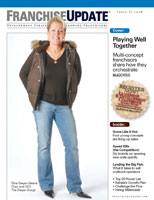Weathering the Crunch
Flexible financing approaches needed in tight credit environment
Let's hope we're already well into a recession. Historically, that's been a good time for franchise sales. But before you start shopping for that new boat, the pain will continue for many brands. But not all.
"The general bad news," says Bernie Siegel, president of Siegel Financial Services, "is that almost every lender has tightened their credit requirements and their underwriting criteria for loans." That stands in stark contrast to six months ago, when all a borrower needed was a down payment and good credit. Siegel, who's been in the business since 1983, cites two reasons for the change: 1) the credit crunch, and 2) an increase in defaults by franchisee borrowers.
The good news, says Siegel, is that franchise systems that have a decent history with SBA loans and not excessively high default rates are still financeable. But, he cautions, not necessarily with the same lenders they have been using.
"The banks have definitely tightened up, without a doubt. This is causing a credit crunch," says Bob Rodi, president of Mount Pleasant Capital Corp. That's good news for Rodi, though.
"As the banks tighten up, other institutions pull out, then people who wouldn't seek out a second-tier lender are going to come look for us. So we're getting a lot of business," he says. "We're a direct lender, not a broker. But there's a lot of opportunity for brokers now too."
As senior vice president at Sovereign Bank in Worcester, Mass., Ken Blum oversaw a team of 12 franchise lending specialists in the Northeast, providing funding to both franchisees and franchisors. Last winter he moved to Ohio to start a new life as a Dunkin' Donuts multiunit owner.
"I haven't seen any change as a borrower," says Blum, who spent more than 20 years on the lending side. But, he says, that has less to do with him than with the strength of his partner.
Says Rodi, "We won't look at a franchisor until they have at least 5 years in business, 200 units or more open at least 12 months for a national brand, or 50 to 75 for a regional." And, he notes, franchisors fail at a higher rate than franchisees.
"If we have a strong franchisor with a great brand who really appears to care about their franchisees--and that's subjective--that's the franchisor I want to partner with," says Rodi. "As a lender we can't afford to have losses, because I don't have any backup collateral. Either the business makes it, or we lose money."
As Blum sees it, "Good borrowers are still in demand, the marginal ones are having a difficult time, and less than marginal are having a very difficult time." And, he says, while his bank continues to provide him with the support he needs, "that could change tomorrow."
What should franchisors do?
In late February, Siegel's company presented an advice-filled webinar, "Franchise Credit Crunch: Meeting the Challenge." To listen, go to www.siegelcapital.com/news.html.
Siegel advises franchisors to take the following steps:
- Franchisors must take a proactive stance to assure financing will be there when they need it. The rules of the game can change at the whim of a single executive, he warns. "Have a person who's dealing with more than one lender at all times and staying on top of the requirements of all of those lenders," he says.
- Carefully monitor all units and act quickly if any are in trouble. When a franchisee is having trouble, he says, the first thing they stop paying is their royalties. Siegel says franchisors should do whatever they can--refranchise, pay off the loan--to keep a store from going dark. And, he says, make the problem transparent to the lender. "Just their seeing you're working with them--versus suddenly there's a default--is the best thing you can do."
- Build in more time for loan approval--and possible failure. Lenders, says Siegel, are doing more due diligence on both franchisors and franchisees, resulting in longer times from application to approval. If a candidate signs a franchise agreement, arranges financing, but takes three to six months to sign a lease, the rules may have changed at the lender. "If an individual franchisee has a loan guarantee now, they may not have it when they find the site," he says.
Sometimes it's hard to even know if the rules have changed. "One lender has told us, 'We've made no changes,' but they have," says Siegel. For instance, they still require the same down payment but now may want something else personal to have in reserve. "They've actually increased the liquidity requirement, but they're not calling it that."
Siegel says many lenders are now requiring direct industry experience by borrowers. "To me that makes no sense. The whole idea is to find a person and train them. Banks tend to overreact," he says. Franchisors should also be taking a more active role in helping candidates secure financing. These days, says Siegel, "Allowing franchisees to go out on their own could be Russian roulette."
Says Rodi, "One of the things we're going to see develop in the next couple of years is franchisors figure out they need to be involved more in the financing process. I already have two programs where the franchisors are stepping up and guaranteeing 80 percent."
Franchisors also should examine their sales process and take responsibility for having new franchisees pre-approved for financing, he says. "I see a lot of SBA brokers provide a one-line letter saying a candidate is 'pre-qualified.' Many interpret that as 'pre-approved,'" says Rodi. Then, after paying the franchise fee and signing a lease, the loan application is turned down.
That's no way to run a business, but with some caution, care, and new approaches tailored to a tighter lending environment, it still is possible not only to make a deal, but for "Grade A" brands and borrowers, to make a good one.
Share this Feature
Recommended Reading:
FRANCHISE TOPICS
- Multi-Unit Franchising
- Get Started in Franchising
- Franchise Growth
- Franchise Operations
- Open New Units
- Franchise Leadership
- Franchise Marketing
- Technology
- Franchise Law
- Franchise Awards
- Franchise Rankings
- Franchise Trends
- Franchise Development
- Featured Franchise Stories
FEATURED IN

Franchise Update Magazine: Issue 2, 2008








 The franchise listed above are not related to or endorsed by Franchise Update or Franchise Update Media Group. We are not engaged in, supporting, or endorsing any specific franchise, business opportunity, company or individual. No statement in this site is to be construed as a recommendation. We encourage prospective franchise buyers to perform extensive due diligence when considering a franchise opportunity.
The franchise listed above are not related to or endorsed by Franchise Update or Franchise Update Media Group. We are not engaged in, supporting, or endorsing any specific franchise, business opportunity, company or individual. No statement in this site is to be construed as a recommendation. We encourage prospective franchise buyers to perform extensive due diligence when considering a franchise opportunity.